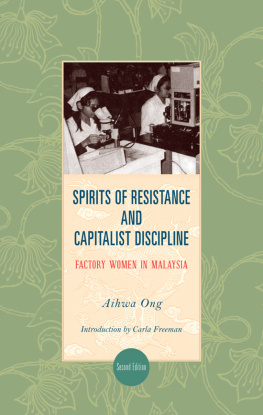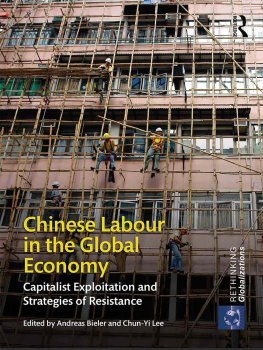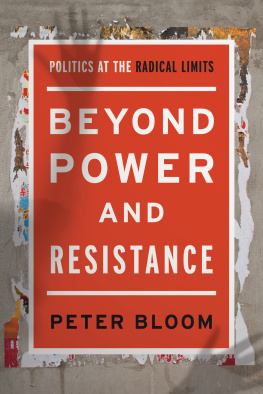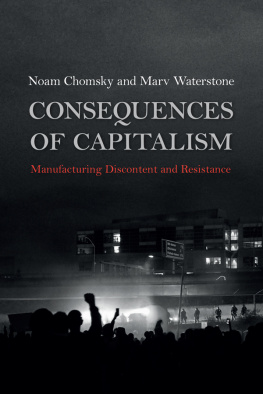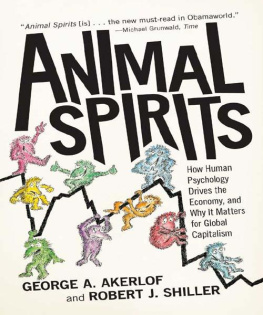Aihwa Ong - Spirits of Resistance and Capitalist Discipline, Second Edition
Here you can read online Aihwa Ong - Spirits of Resistance and Capitalist Discipline, Second Edition full text of the book (entire story) in english for free. Download pdf and epub, get meaning, cover and reviews about this ebook. year: 2010, publisher: SUNY Press, genre: Politics. Description of the work, (preface) as well as reviews are available. Best literature library LitArk.com created for fans of good reading and offers a wide selection of genres:
Romance novel
Science fiction
Adventure
Detective
Science
History
Home and family
Prose
Art
Politics
Computer
Non-fiction
Religion
Business
Children
Humor
Choose a favorite category and find really read worthwhile books. Enjoy immersion in the world of imagination, feel the emotions of the characters or learn something new for yourself, make an fascinating discovery.
Spirits of Resistance and Capitalist Discipline, Second Edition: summary, description and annotation
We offer to read an annotation, description, summary or preface (depends on what the author of the book "Spirits of Resistance and Capitalist Discipline, Second Edition" wrote himself). If you haven't found the necessary information about the book — write in the comments, we will try to find it.
Aihwa Ong: author's other books
Who wrote Spirits of Resistance and Capitalist Discipline, Second Edition? Find out the surname, the name of the author of the book and a list of all author's works by series.
Spirits of Resistance and Capitalist Discipline, Second Edition — read online for free the complete book (whole text) full work
Below is the text of the book, divided by pages. System saving the place of the last page read, allows you to conveniently read the book "Spirits of Resistance and Capitalist Discipline, Second Edition" online for free, without having to search again every time where you left off. Put a bookmark, and you can go to the page where you finished reading at any time.
Font size:
Interval:
Bookmark:
Capitalist Discipline

www.sunypress.edu
Marketing by Anne M. Valentine
Malaysia/Aihwa Ong. 2nd ed.
TABLES |
Malay Population in Selangor, 18911957 |
Crop Acreage in Selangor, 19331948 |
Prices Obtained by Kampung Malay Smoked Sheet Rubber, Selangor, 19321958 |
Ethnic and Sexual Division of Estate Workers, Selangor, 1948 |
Acreage Under Cash Crops in Kuala Langat, 19661978 |
Estimated Average Monthly Incomes from Malay Holdings, Kuala Langat, 1979 |
Distribution of Households by Land Access, Sungai Jawa, (Sample of One-Third of Total Population), 1979 |
Primary Occupations of Household Heads by Land Access, Sungai Jawa, 1979 |
Average Daily Work Time (in Hours) by Men and Women in Forty Households, Sungai Jawa, 1979 |
Average Daily Work Time (in Hours) by Girls and Boys in Forty Households, Sungai Jawa, 1979 |
Composition and Size of 242 Households, Sungai Jawa, 1979 |
Retention and Dispersal of Children 18 Years and Older in 138 Families, Sungai Jawa, 1979 |
Average Labor Time Spent by Children and Adults in Household and Income-Earning Activities, Sungai Jawa, 1979 |
Primary Occupations of Men and Women, One-Third Total Population, Sungai Jawa, 1979 |
Causes of Malay Divorces by Percentage Each Year, Kuala Langat, 196979 |
Peninsular Malaysia: Distribution of Total Labor Force by Industry, 197080 |
Average Wage Rates in Selected Industries for Manual Laborers in Selangor, 1976 |
Distribution of EJI Employees by Ethnicity, Gender, and Earnings, 1979 |
MAPS |
Selangor: Districts, Pre-1942 Boundaries |
Kuala Langat: Land Use, Towns and Transportation Lines to the Klang Valley |
DIAGRAMS |
Work Organization and Occupation Ranks in EJI, Telok Free Trade Zone, 1979 |
Ethnic and Gender Distribution in the Transistor Assembly Section in EJI, Telok Free Trade Zone, 1979 |
Font size:
Interval:
Bookmark:
Similar books «Spirits of Resistance and Capitalist Discipline, Second Edition»
Look at similar books to Spirits of Resistance and Capitalist Discipline, Second Edition. We have selected literature similar in name and meaning in the hope of providing readers with more options to find new, interesting, not yet read works.
Discussion, reviews of the book Spirits of Resistance and Capitalist Discipline, Second Edition and just readers' own opinions. Leave your comments, write what you think about the work, its meaning or the main characters. Specify what exactly you liked and what you didn't like, and why you think so.

